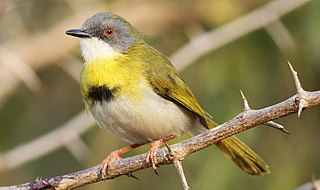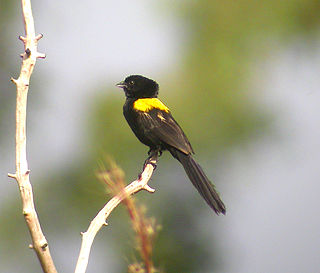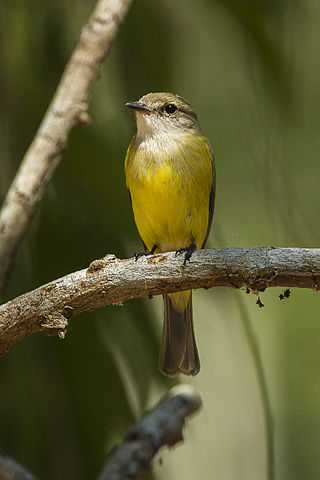
The Guinea turaco, also known as the green turaco or green lourie, is a species of turaco, a group of African otidimorph birds. It formerly included the Livingstone's, Schalow's, Knysna, black-billed and Fischer's turacos as subspecies.

The oriole finch is a small passerine bird in the finch family. It is found in Africa and is native to Burundi, Cameroon, Democratic Republic of the Congo, Equatorial Guinea, Kenya, Malawi, Nigeria, Rwanda, South Sudan, Tanzania and Uganda. It lives in subtropical or tropical moist evergreen montane forests.

The black-and-white mannikin also black-and-white munia or red-backed mannikin, is a species of estrildid finch, widely occurring throughout the African tropical rainforest. It has an estimated global extent of occurrence of 4,200,000 km2. It is found in moist savanna and subtropical or tropical moist lowland forest habitat. The status of the species is evaluated as least concern. They are seedeaters, but are known to feed on algae.
The tiny pipistrelle is a species of vesper bat. It can be found in Benin, Burkina Faso, Cameroon, Central African Republic, Democratic Republic of the Congo, Ivory Coast, Equatorial Guinea, Gabon, Ghana, Guinea, Kenya, Liberia, Nigeria, Senegal, Sierra Leone, and Uganda. It is found in subtropical or tropical dry forest, subtropical or tropical moist lowland forest, and moist savanna.

The slender-billed greenbul is a species in the monotypic genus Stelgidillas of the bulbul family of passerine birds. It is found in western and central Africa. Its natural habitats are subtropical or tropical dry forest, subtropical or tropical moist lowland forest, and subtropical or tropical moist montane forest.

Cabanis's greenbul, also known as Cabanis's bulbul, is a species of songbird in the bulbul family, Pycnonotidae. It is found in east-central and south-central Africa. Its natural habitats are subtropical or tropical dry forest, subtropical or tropical moist lowland forest, subtropical or tropical moist montane forest, and subtropical or tropical moist shrubland.

The yellow-breasted apalis is a species of bird in the family Cisticolidae.

The black-and-white shrike-flycatcher, also known as the black-and-white flycatcher or vanga flycatcher, is a species of passerine bird found in Africa. It was placed with the wattle-eyes and batises in the family Platysteiridae but is now considered to be more closely related to the helmetshrikes and woodshrikes.

The olive-green camaroptera is a bird species in the family Cisticolidae.

The snowy-crowned robin-chat is a species of bird in the family Muscicapidae. It is also known as the snowy-headed robin-chat. It is found in Angola, Benin, Burkina Faso, Burundi, Cameroon, Central African Republic, Chad, Republic of the Congo, Democratic Republic of the Congo, Ivory Coast, Ethiopia, Gabon, Gambia, Ghana, Guinea, Guinea-Bissau, Kenya, Liberia, Mali, Mauritania, Niger, Nigeria, Rwanda, Senegal, Sierra Leone, Sudan, Tanzania, Togo, and Uganda. Its natural habitats are subtropical or tropical dry forest, subtropical or tropical moist lowland forest, and moist savanna.

The chestnut-capped flycatcher is a species of bird in the family Erythrocercidae.

The yellow-mantled widowbird, also known as the yellow-backed widow, is a species of bird in the family Ploceidae.

The cream-browed white-eye, also known as the cream-browed ibon or yellow-browed white-eye, is a species of bird in the family Zosteropidae. It is endemic to the Lesser Sunda Islands. Its natural habitat is subtropical or tropical moist montane forest.

The crested malimbe is a species of bird in the family Ploceidae. It is found in Angola, Cameroon, Central African Republic, Republic of the Congo, Democratic Republic of the Congo, Ivory Coast, Equatorial Guinea, Gabon, Ghana, Guinea, Liberia, Mali, Nigeria, Sierra Leone, Togo, and Uganda. Its natural habitat is subtropical or tropical moist lowland forests.

The African shrike-flycatcher or red-eyed shrike-flycatcher is a species of bird in the family Vangidae. It is monotypic within the genus Megabyas. It is found in Angola, Benin, Cameroon, Central African Republic, Republic of the Congo, Democratic Republic of the Congo, Ivory Coast, Equatorial Guinea, Gabon, Gambia, Ghana, Guinea, Kenya, Liberia, Mali, Nigeria, Sierra Leone, South Sudan, Tanzania, Togo, Uganda, and Zambia. Its natural habitats are subtropical or tropical dry forests and subtropical or tropical moist lowland forests.

The lemon-bellied flyrobin or lemon-bellied flycatcher is a species of bird in the family Petroicidae. Found in Australia, Indonesia, and Papua New Guinea, its natural habitats are subtropical or tropical moist lowland forests and subtropical or tropical mangrove forests.

The yellow-bellied wattle-eye is a species of bird in the family Platysteiridae. It is found in Angola, Burundi, Cameroon, Central African Republic, Republic of the Congo, Democratic Republic of the Congo, Ivory Coast, Equatorial Guinea, Gabon, Ghana, Guinea, Kenya, Liberia, Nigeria, Rwanda, Sierra Leone, Tanzania, and Uganda. Its natural habitats are subtropical or tropical moist lowland forests and subtropical or tropical moist montane forests.

The white-chinned prinia, also known as the white-chinned warbler, is a species of bird in the family Cisticolidae.

The Peruvian thick-knee is a species of bird in the family Burhinidae. It is found in Chile, Ecuador, and Peru. Its natural habitats are subtropical or tropical dry shrubland, subtropical or tropical seasonally wet or flooded lowland grassland, and pastureland. It is a ground-dwelling bird and feeds on insects and small animals.

Fraser's musk shrew is a species of mammal in the family Soricidae. It is found in Benin, Cameroon, Ivory Coast, Equatorial Guinea, Ghana, Guinea, Liberia, Nigeria, São Tomé and Príncipe, Sierra Leone, and Togo. Its natural habitat is subtropical or tropical moist lowland forests. This large black shrew was first described by the British zoologist Louis Fraser in 1843. Its exact definition is unclear; the karyotype comes from Ivory Coast but not from Equatorial Guinea, which is given as the type locality.




















